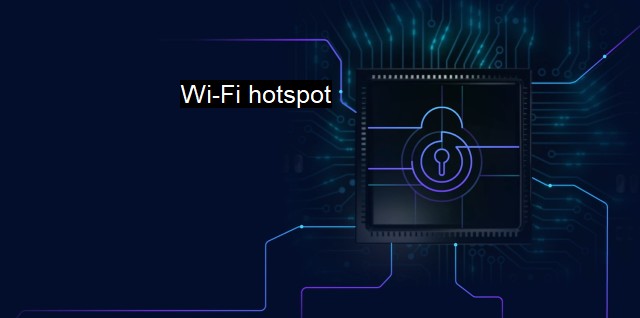What is Wi-Fi hotspot?
The Impending Threat: Cybersecurity Risks and Antivirus Challenges in Wi-Fi Hotspot Networks
A Wi-Fi hotspot is a physical location that allows people to connect their devices to the internet, usually through wireless technology. These areas are typically equipped with a broadband router or other networking device that transmits a signal a certain distance around it. This range can be as small as a single room to as large as a few city blocks, depending on the power of the equipment being used. By connecting to a Wi-Fi hotspot, users can access the internet without having to use their own data plans, which can be beneficial in public locations like libraries, airports, or coffee shops.Along with the convenience that Wi-Fi hotspots bring, they also present significant cybersecurity risks. From a cybersecurity perspective, Wi-Fi hotspots are problematic because of the open nature of the wireless signals they use. These signals can be intercepted by malicious actors, who can manipulate or steal the information being transmitted. This threat increases significantly when the hotspot is public, as anybody has the ability to connect to it and conduct their activity under the privacy of the network.
Various forms of cybersecurity breaches can occur on these networks, targeting both individuals and businesses alike. The simplest is eavesdropping through which malicious users intercept the data stream between the user's device and the hotspot to gain unauthorized access to sensitive information, such as passwords and financial details.
For this reason, cybersecurity measures are crucial when using Wi-Fi hotspots. One common method to mitigate these hazards is through the use of virtual private networks (VPNs). Using a VPN, internet connections can be encrypted, meaning that even if data is intercepted, it cannot be understood or used by the malicious actors. It works by routing the data through a server which can be located anywhere in the world, and encrypting it before it is sent to its destination. This renders the data unreadable until it reaches its intended recipient.
Having a high-quality, updated antivirus software is another essential layer in the cybersecurity measures of Wi-Fi hotspot users. Antivirus software helps in identifying and eliminating viruses or malware that may infect a user's device, either by being downloaded unknowingly or planted by an infiltrator on the network. This offers an active defense against potential threats and can assist in maintaining the safety and security of users' data.
Importantly, a secure and understandable user behavior can play a crucial role in ensuring cybersecurity. Being prudent in dealing with Wi-Fi hotspots requires avoiding networks that are not secure or appears suspicious. Users should also take care to avoid conducting sensitive transactions such as banking operations or entering login credentials on unprotected sites when using public Wi-Fi.
Enabling the automatic connection feature of the device can also open a window of exploitation for cyber threats. Therefore, it's recommended to disable any automatic connection features to avoid inadvertently joining a rogue Wi-Fi network expressly set up by authenticated access snatchers for data theft.
Wi-Fi hotspots, while serving as an excellent convenience for internet users globally, present a considerable cyber risk that should not be underestimated. Appropriate cybersecurity measures such as VPN, antivirus software, and vigilant user behavior can protect against these potential hazards in the digital environment. As cyber threats continue to evolve in sophistication, it is the responsibility of all users to remain vigilant and adopt their security measures accordingly.

Wi-Fi hotspot FAQs
What is a Wi-Fi hotspot?
A Wi-Fi hotspot is an access point that provides wireless internet connectivity using a router, modem, or any other internet-connected device. It allows users to connect to the internet via wireless devices such as laptops, smartphones, and tablets.How secure is a Wi-Fi hotspot?
Wi-Fi hotspots are generally secure, but they can be vulnerable to various security threats such as hacking, snooping, and malicious attacks. Therefore, it is important to ensure that you connect only to secure Wi-Fi networks with strong encryption and to use antivirus and anti-malware software to protect your device.What are the risks of using a public Wi-Fi hotspot?
Public Wi-Fi hotspots can pose many risks to users, including unauthorized access to their personal information, hacking, spyware, and malware attacks. Attackers can easily intercept and steal sensitive data and passwords transmitted over public Wi-Fi networks, including credit card numbers, email addresses, and login credentials.What can I do to protect myself on a Wi-Fi hotspot?
To protect yourself on a Wi-Fi hotspot, always connect to secured Wi-Fi networks that require authentication and use a Virtual Private Network (VPN) to encrypt your traffic. Also, disable file sharing and turn off auto-connection to public Wi-Fi networks. Additionally, install and keep your antivirus and anti-malware software updated.| | A | | | B | | | C | | | D | | | E | | | F | | | G | | | H | | | I | | | J | | | K | | | L | | | M | |
| | N | | | O | | | P | | | Q | | | R | | | S | | | T | | | U | | | V | | | W | | | X | | | Y | | | Z | |
| | 1 | | | 2 | | | 3 | | | 4 | | | 7 | | | 8 | | |||||||